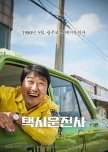"I am taxi driver, you are taxi 손님."
There are at least two countries that I have learned a lot about and admire: the United States and South Korea. The book Human Acts by Han Kang accidentally came into my posession two years ago, and it's extremely vivid and graphic depiction of Gwangju Uprising made me want to learn more and more about Korean history to find out what have this nation come through to become a leading democratic country that the world looks up to nowadays.
🔸️There were only several foreigners in Gwangju on the first days of the massacre, including 5 Peace Corps volunteers, and all of them chose not to abandon their Korean colleagues and friends despite the direct warnings from the American Ambassador. Later, when a few foreign reporters, including this movie's main character Jürgen Hinzpeter, arrived, they helped them by being their interpreters. If you have seen the movie you already know what happened to the fictional character Jae Shik. A few Koreans who did speak English would not desire that attention from the ubiquitous KCIA.
🔸️I love A Taxi Driver for its amazing execution, production design, and a pretty much historically accurate timeline. It succeeds in capturing the sense of confusion and danger coming from all the sides and making spectacular and tragic scenes like the taxi cars battle and the arrogant German reporter coping with shock and guilt by filming his dead companion and the bloody havoc around. No one in Gwangju knew what was going on, later hearing the infuriating official news that the upheaval was incited by "bandits" and "impure elements from outside the city".
From "Witnessing Gwangju" by Paul Courtright: "The [elderly Korean] halmeoni's grip tightened on my arm and she turned to face me. 'We have no voice. You have to be our voice. You have to tell people outside our country what they're doing to us'. She glanced around the street, then returned her fearless gaze to me. I was rooted to the spot. I was to be the "witness" and she had given me a clear task."
🔸️No country exists in a vacuum, and I find it fascinating how people from different provinces, from different nations can work together, bond, and help each other, i.e. Seoul and Gwangju taxi drivers, Gwangju people and foreign reporters, volunteers. Man Seop didn't choose between his daughter and a grown-ass foreigner reporter. He was choosing between what's best for his family and what's best for his country. Along with self-sacrifice this makes it a clear patriotic idea for the movie.
I've been learning about the Gwangju Uprising from the article of the witness Peace Corps volunteer Tim Warnberg "The Kwangju Uprising: An Inside View", 1987, and the memoir "Witnessing Gwangju", 2020, by Paul Courtright. I highly recommend to read them if you're interested, as the writing is highly detailed, captivating and visual.
🔸️There were only several foreigners in Gwangju on the first days of the massacre, including 5 Peace Corps volunteers, and all of them chose not to abandon their Korean colleagues and friends despite the direct warnings from the American Ambassador. Later, when a few foreign reporters, including this movie's main character Jürgen Hinzpeter, arrived, they helped them by being their interpreters. If you have seen the movie you already know what happened to the fictional character Jae Shik. A few Koreans who did speak English would not desire that attention from the ubiquitous KCIA.
🔸️I love A Taxi Driver for its amazing execution, production design, and a pretty much historically accurate timeline. It succeeds in capturing the sense of confusion and danger coming from all the sides and making spectacular and tragic scenes like the taxi cars battle and the arrogant German reporter coping with shock and guilt by filming his dead companion and the bloody havoc around. No one in Gwangju knew what was going on, later hearing the infuriating official news that the upheaval was incited by "bandits" and "impure elements from outside the city".
From "Witnessing Gwangju" by Paul Courtright: "The [elderly Korean] halmeoni's grip tightened on my arm and she turned to face me. 'We have no voice. You have to be our voice. You have to tell people outside our country what they're doing to us'. She glanced around the street, then returned her fearless gaze to me. I was rooted to the spot. I was to be the "witness" and she had given me a clear task."
🔸️No country exists in a vacuum, and I find it fascinating how people from different provinces, from different nations can work together, bond, and help each other, i.e. Seoul and Gwangju taxi drivers, Gwangju people and foreign reporters, volunteers. Man Seop didn't choose between his daughter and a grown-ass foreigner reporter. He was choosing between what's best for his family and what's best for his country. Along with self-sacrifice this makes it a clear patriotic idea for the movie.
I've been learning about the Gwangju Uprising from the article of the witness Peace Corps volunteer Tim Warnberg "The Kwangju Uprising: An Inside View", 1987, and the memoir "Witnessing Gwangju", 2020, by Paul Courtright. I highly recommend to read them if you're interested, as the writing is highly detailed, captivating and visual.
Esta resenha foi útil para você?


 1
1
















